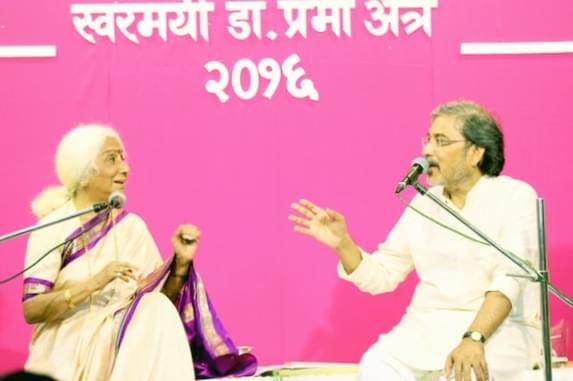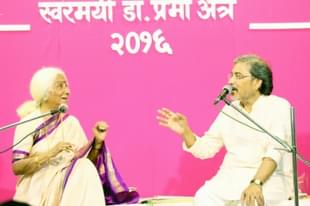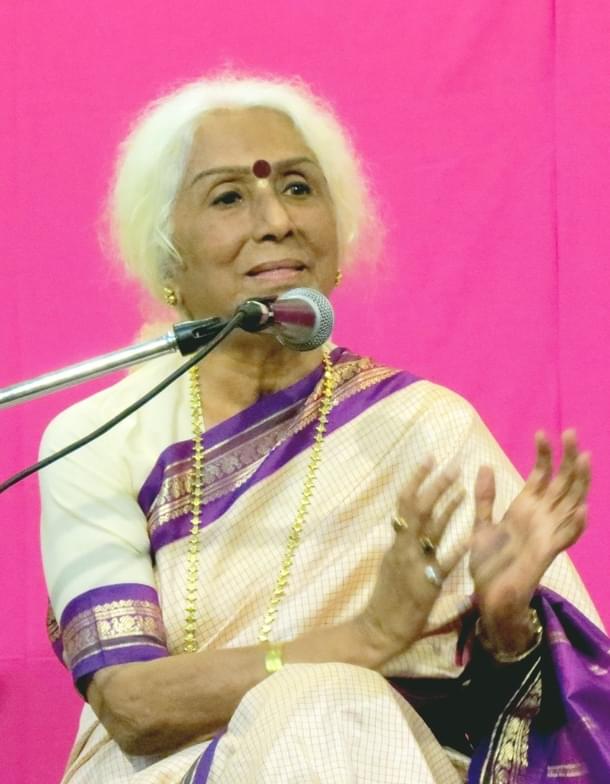Culture
Musicians Need To Be More Responsible In Their Approach To Music: Prabha Atre
Raja Pundalik
Aug 21, 2016, 11:36 AM | Updated 11:36 AM IST
Save & read from anywhere!
Bookmark stories for easy access on any device or the Swarajya app.


She came to music accidentally, as she’s fond of saying. But once the octave spun its magic around her, there was no way out of the enticing web— she didn’t even want out.
Having initially trained under Shri. Vijay Karandikar, young Prabha Atre was accepted as a disciple by Pt Sureshbabu Mane, son of Ust Abdul Karim Khan and the inheritor of the Kirana Gharana tradition, while still in her mid-teens. Later, after her taleem was abruptly interrupted by Sureshbabu’s untimely demise, she trained under Vidushi Heerabai Barodekar for a while. But, thereafter, her’s was mostly a lone journey— a journey that encouraged her to take up music full-time (despite a brilliant academic record with degrees in Science and Law) and join All India Radio as a producer where she worked for almost a decade.
She also completed a doctorate in the use of sargam (solfège) notes in Hindustani Music. Later, she moved on to SNDT Women’s University as the Head of Post-Graduate studies in Hindustani Music and undertook a complete make-over of this branch of applied education. Her work as an educator has been acknowledged as path-breaking even today. She has been a prolific performer on the classical music stage all over the world and is credited with one of the top-selling and most widely heard recording in Hindustani music (Raag Maru-Bihag, Kalavati and Khamaj Thumri released by HMV in 1971) that is popular even among the youth of today.
Despite this hectic journey, spanning over six decades, she made time to write and publish numerous books, and wrote for many periodicals. She also composed a number of bandishes in existing raag-matrices and envisioned a few new raag-matrices afresh. Honoured with the Padma Bhushan, Sangeet Natak Academy Award, Tagore Academy Ratna Award, Kalidas Samman and many more laurels, Dr Prabha Atre is a revered Guru and an unimpeachable authority on things musical. Her opinions are candid and she speaks straight from the heart without mincing words.
Dr Prabha Atre, the senior-most vocalist from the iconic Kirana gharana of Hindustani gayaki today, was in Nashik recently. She spoke to this writer extensively during a public interaction organized for the ‘लेखक तुमच्या भेटीला’ (‘Meet the Author’) event hosted by Jyoti Prakashan (Nashik) on 6 August 2016.
Here are the excerpts from this interaction—which saw great attendance of an eager audience,
Raja Pundalik: Prabha-tai, you have always said that your introduction to Hindustani Classical music was purely an accident. Your first music Guru was Shri Vijay Karandikar. But from there, you went directly to Pt Sureshbabu Mane. This was like a quantum leap— how did this come about?
Dr Prabha Atre: Let me first tell you about the accident. I had no background in music in the family but music entered our household for the benefit of my mother who needed a diversion from her medical condition. Within a short while, I was showing more inclination to learn music. After a few days, Shri Vijay Karandikar (my father’s friend) offered to teach me more. Apparently, I must have been picking up well because sometime later,one of my father’s friends suggested that I should learn from Pt Sureshbabu Mane. Sureshbabu was already a well-known vocalist and a Guru by then and my father, being a typical Maharashtrian school head-master, felt a little hesitant to approach him. But he was soon convinced and Sureshbabu took me on as a disciple after a proper test. I think I sang “Raag Madhuwanti” and “Ka Karu Sajani” (Bhairavi thumri) before him.
Raja Pundalik: Tell us a little more about Sureshbabu’s taleem— the way he taught, his thought-process, etc.
Dr Prabha Atre: My taleem with Pt. Sureshbabu lasted just for about six years. But in that short span, he sowed the seeds of Kirana Gayaki in my mind. He insisted that I do not “follow” him but think in a “parallel” manner. In simple terms, it meant that I do not copy his phrases or style blindly but create my own phrases and style. The crux of the matter was that I was encouraged to think independently and creatively right from the word go. I was very fond of thumri, so I listened to a number of performers, especially Ust Bade Ghulam Ali Khan, Roshan Ara Begum, etc. My Guru encouraged this habit and he was, from this perspective, way ahead of the times.
In those days, listening to performers from other gharana-styles was a taboo— let alone trying to imbibe elements of their styles into your own! But Sureshbabu went to the extent that he used to ask me to sing Bade Ghulam Ali Khan-saab’s thumris before his friends. The funniest part was that I had to drag him out of his hangouts with friends so that I could sit before him and learn. He loved to spend time with his friends.
Raja Pundalik: It must have been a shock for you when Pt Sureshbabu Mane suddenly passed away in 1953. You were barely in your twenties then.
Dr Prabha Atre: Yes, it was a shock. But then the positive attitude I was brought up on made me march ahead like an Eklavya. My Guru, before he passed away, had given me enough material, inputs and independence to continue my sadhana on my own. I must acknowledge here that “Gaan-Heera” Smt Heerabai Barodekar, Sureshbabu’s sister, did support me initially during those years. But the “Guru-Shishya” relationship I shared with Sureshbabu was so intense that I could not put anyone else on that pedestal after him. That was when I decided to pursue music on my own and find my own path.
Raja Pundalik: Surely it was not an easy option? Of course, by then you had an excellent academic background with a Bachelor’s degree in Science and a double-graduation in Law. Was it difficult to make a career choice? You could easily have become a successful lawyer.
Dr Prabha Atre: I did not want to dissect a frog and lizard or defend a criminal in the court. To me, the choice was obvious and clear. I wanted to make a career in music.
So I joined the All India Radio’s (AIR) music department. It was here that I was exposed to numerous styles of Hindustani & Carnatic music, both vocal and instrumental. I interacted with a number of great performers who came to AIR for recordings or live performances. It was but natural that my thinking was influenced by their styles. I was attracted towards the usage of sargam in Carnatic music. Similarly, Ust Amir Khan-saheb’s approach to classical music and its presentation impressed me deeply. He also had a wonderful way of using sargam in his presentation. I tried to assimilate this aspect in my singing. My presentation and compositions bear testimony to my independent approach to using sargam.
Listen to Dr Prabha Atre’s “Raag Kalawati” where she sings her own bandish that shows subtle influences of Carnatic music and sargam (otherwise not used in Hindustani music):
Raja Pundalik: That brings me to the question about your compositions. When and why did you feel the need to compose your own bandishes?
Dr Prabha Atre: I started composing as a part of my job with the AIR. During my first posting at Ranchi, I was asked to compose for an opera to be broadcast from Ranchi Radio Station. Actually, I had never composed a single line before this incident and was, naturally, very apprehensive. But a colleague, who used to be a sarangi-player, came to my aid and we did the job nicely. Thereafter, I composed a number of radio features in my 10-year tenure with the radio.
As far as bandishes are concerned, I was forced to compose my own simply because whatever I wanted to convey through my music could not be expressed through the available compositions at the time. My Guru had blessed me with an independent approach and I wanted to convey something new, different, suitable to my style. This was the compulsion that led me to compose my own bandishes. The first bandish I composed was “Jagu Mein Sari Raina” in Raag Maru-Bihag and it created history. It also established me as a composer and I am happy that even today’s generation loves to hear it and sing it in their own way.
I think my compositions became popular because they were listener-friendly with easy-to-understand (and yet musical) words and an aesthetically appealing framework of notes without compromising on the purity of the raag-matrix. I also think that the traditional ethos of the raag-matrices takes on a slightly more intense color in my bandishes and that’s why music-lovers like it.
Raja Pundalik: You also composed a few new raag-matrices that were well-appreciated by music lovers. What was the logic behind this vision?
Dr Prabha Atre: I always observed that most of the performers present raag-matrices with slight variations. There is, however, no standardisation of such variants. So I started composing bandishes to suit my approach to the raag and my style of presentation.
Here is Prabha-tai’s “Raag Madhur-Kauns” sung live in a concert a few years back. She sings her own composition:
Raja Pundalik: Prabha-tai, you also started writing at a very young age. Tell us about the urge to express yourself in this manner.
Dr Prabha Atre: Let me clarify here, at the outset, that I am only a classical vocalist and whatever I did besides singing is only an extension of my singing activity. I was born and brought up in a family where saying “I can’t do it”, without at least giving a try, was not allowed. So when one of my father’s friends approached me for an article on classical music in “Rudrawani”, a weekly published from Pune, I simply could not say no! That article brought me so much favorable response from readers that I naturally started writing more frequently.
Subsequently, when I became professional performer, a Guru and a composer, I needed to convey to my listeners and music-lovers my thought process about doing things differently. Now given that not everyone can understand technicalities and subtle nuances of musical language, one must communicate in a language that everyone understands. That was the sole reason why I started writing about my music. My books Swaramayee (a collection of various articles on experiences, memoirs and musical thought-process) in Marathi was well-received by readers and music-lovers alike, and Suswarali is also a compilation of articles on the theory and technical aspects of music. Swarangini, Swaranjani and Swararangee are books of my compositions. They have also been translated into other languages.
Raja Pundalik: Your second stint after AIR was with SNDT Women’s University as the Head of Post-Graduate studies in Music. You are credited with overhauling the entire course-structure and courseware to make it more contemporary and relevant for students. Tell us about your impressions of institutionalised, mass-scale music education.
Dr Prabha Atre: I think there is a common impression in society that if it is music education, it must be classical music. But there are so many other aspects of music that are equally difficult to appreciate and pursue. Film music, Natya-Sangeet in Marathi, Folk-Music, Carnatic music, Western music, etc. are all full-fledged domains that necessitate separate approach and dedication. When I joined SNDT, I thought of introducing all these domains, at least in their basic forms, to students of music to give them a more rounded exposure.
Raja Pundalik: Prabha-tai, you have been a prolific performer across the globe for the past several decades and have seen the commercial side of the music-profession undergo a sea change in this period. Tell us what you feel about the present situation.
Dr Prabha Atre: I think music, as a profession, has come to depend too heavily on the sponsors who provide the wherewithal to conduct various concerts and festivals in the country. I fully agree that music and musicians need financial support to survive and strive. But the tendency to pay for enjoying good music seems to be going down amongst the music-lovers these days. I owe my entire musical career to my listeners because had they not paid to listen to my concerts, not bought my records and cassettes, I would not have become a full-time musician.

On the flip side, the musicians also need to be more responsible in their approach to music, the commitment to deliver value-for-money to listeners and simple things like punctuality, etc. If musicians are behaving irresponsibly, it’s the society’s duty to make them realise it. Media, both print and electronic (including social media), also has an important role to play in this process. Somehow, it is only doing a skeletal job of reporting. You will hardly find any informed, studied critics in today’s media. So the situation keeps snowballing and is not very healthy. But I am always hopeful about the future of music.
Prabha-tai has the serene look of a “Karmayogi” around her personality and, rightly so, since she has seen it all and done it all without much of ado. Despite being the senior-most living and performing vocalist of the iconic Kirana Gharana, she has no airs about her. She loves to talk music with younger generation and insists that they should approach her in case they do not agree with her opinions. She is forever willing to consider a fresh point of view and make music more enjoyable! Here’s wishing her many happy returns as she enters into her 85th year on 13 September 2016! May she have a healthy and musical 100 years here on.
Header image credits: Nitin Bildikar
Raja Pundalik is a passionate listener of classical music and has contributed numerous features/articles on music to various publications. He blogs at http://music-fundaaz.blogspot.com and tweets at @rajapundalik





